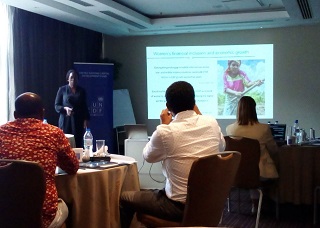By Andualem Sisay Gessesse – Kifiya Financial Technologies, the pioneer fintech company in Ethiopia advised the Government of Ethiopia to provide risk and liquidity facilities for fintech companies that are introducing collateral free lending to small and microbusinesses.
Risk and liquidity facilities are needed by financial institutions to enable the institutions provide small credit facilities without collateral to the people engaged in small and microbusiness, according to Munir Duri, CEO and founder of Kifiya Financial Technologies PLC, which introduced digitalized utility payment in Ethiopia about a decade ago.
Even though the financial institutions use the latest Artificial Intelligence (AI) technologies to analyze credit worthiness, the financial institutions still take some level of risks when they extend lending without collateral to the small and microbusinesses, according to Mr. Munir, who advised the government of Ethiopia to consider providing risk and liquidity related facilities to the institutions.
Mr. Munir made the remark on Tuesday a media workshop held at Radisson Blu Hotel, Addis Ababa on Women’s Digital Financial Inclusion (WDFI). The media workshop organized by the UN Capital Development Fund (UNCDF) through its flagship gender initiative, is aimed to share information about the potential of Digital Financial Services (DFS) to transform the lives of unbanked Ethiopians, especially women who lack access to formal financial services.
Commenting to New Business Ethiopia on the issue, Melaku Kinfegabriel, Business Consultant at Premier Consult, argues that lending to small and microbusinesses without collateral is much less risky than lending to big and medium size businesses with collateral. This is mainly because of the large number of small and microbusiness and the small amount of the credit the financial institutions lend to each enterprise, as compared to the large amount of loan each medium and large business access.
“Instead of demanding the Government to provide risk and liquidity facilities, I suggest these financial institutions to but group insurance that can minimize their risk of default by extending collateral free loans to the small and microbusinesses,” Mr. Melaku suggests.
Currently banks in Ethiopia such as, Cooperative Bank of Oromia, and the state-owned Ethio Telecom are providing uncollaterized digital lending to small and microbusinesses.
Involving different presentations and a panel discussion, the media workshop has provided insights into the state of digital financial inclusion in Ethiopia and how DFS can drive economic participation for vulnerable communities in emerging economies.
It was in June 2022 that UNCDF launched the Women’s Digital Financial Inclusion (WDFI) Advocacy Hub in Ethiopia, with the aim to promote policy change and support gender-inclusive digital economies, according to the media workshop organizers.
It is also indicated that the initiative, in partnership with Women’s World Banking, brings together local, regional, and global stakeholders to accelerate progress in WDFI. The Hub complements the efforts of the National Bank of Ethiopia to implement the National Financial Inclusion Strategy, National Digital Payments Strategy, and Digital Ethiopia 2025 Strategy, which are crucial in creating an ecosystem where technology can be leveraged to live financially secure lives.

